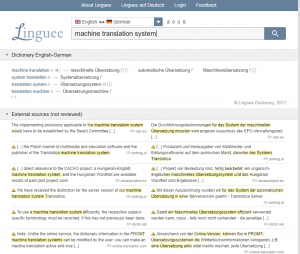August 2017 the company that operates the Linguee online dictionary launched a machine translation tool called DeepL.
Linguee, the power behind DeepL

Linguee is a free online dictionary combined with a search engine that scours the web for bilingual texts and websites. Its terminology searches bring up straightforward translations of words followed by countless example sentences as translated by real translators. The entries can be edited and improvements suggested, and Linguee highlights translations that have not been verified.
The program is often excellent. Nevertheless, a human translator needs to know their subject matter, so they can judge the suitability of a suggested translation. There are some shocking errors that are repeated time and time again.
DeepL, a machine translation tool, set to outdo Google translate
Using all the millions of dictionary entries and example sentences, Linguee has now developed a new free online translation service. It offers English, German, French, Dutch, Spanish, Italian and Polish translations. Their aim is to compete, eventually, with Google Translate.
DeepL’s interface is similar to that of other online machine translation tools. Users enter their source text into a box on the left and the translation appears in a box on the right. Clicking on a term in the source text brings up further suggestions from the Linguee dictionary. Clicking on a term in the translated text brings up alternative translations that the user can select and insert with a click.
Is this another step forward for machine translation tools and another step back for human translators?
Legal translations
I have heard from various translation colleagues who tested DeepL, applying their language combination and specialist subjects. They report that it is surprisingly good for the translation of standard legal documents, such as terms and conditions, data protection notices and laws and regulations etc. The question is how good the legal translations are when texts become more specific. Can the program differentiate between civil and criminal law, for example, especially when the individual sentences in a text don’t specify which applies?
Texts for certification should not be translated with DeepL because a translator cannot certify the accuracy of a machine-translated text – human translators certify the accuracy of their own translations.
And any document that might at any time be used in court – or that is translated for the purpose of being used in a court case – may not be accepted by a court if it hasn’t been translated by a human translator.
Machine translation for technical translation purposes
The DeepL translator is very useful for general technical translations. Testing it with information from a data safety sheet had excellent results. However, the program confused the terms performance, achievement, attainment and rating.
Can the machine translator replace human translators?
The machine translation tool is very good in many respects. It is therefore likely that clients will use it instead of employing a human translator. They will do this expecting a perfect translation, equivalent in quality to what a “real” translator might produce. What is more, translators may use it and not notice the many possible errors it can contain.
There are obvious weak points to DeepL. One translator testing the new translation tool noticed that the program translated groups of words and telephone numbers twice. What is more, in long paragraphs, some segments were simply lost.
It requires the careful comparison of source text and translation by an experienced human translator with the appropriate skills to notice this.
Sometimes, errors change the meaning of a sentence to its opposite.
Take the following sentence:
“… the potentially adverse implications for X from a Donald Trump administration, including from possible trade protectionists and anti-immigration measures…”
The German translation reads as follows:
“… die potenziell negative Auswirkungen einer Donald Trump-Regierung auf X, einschließlich möglicher Maßnahmen gegen Handelsprotektionisten und Einwanderer….”.
When translated back into English, this is the result:
“… the potential adverse implications of a Donald Trump administration for X, including possible measures against trade protectionists and immigrants…”
A huge mistake, but not an immediately obvious one.
Privacy concerns
The data protection information on DeepL is very clear on this point. It explains that the site will use information provided by users to perfect DeepL’s algorithms and translations. That raises concerns for business users and translators alike.
- Does a company really want to have its T&Cs stored on a public machine translation website?
- Would a client want their private information contained in a certified translation be available for anyone searching online?
- Would a company want a patent application visible online in example sentences?
In fact, DeepL’s data protection information page states: “Please note that you may not use our translation service for any texts containing personal data of any kind.” Therefore, companies need to think about their own requirements for data protection. Translators need to remember that they may have signed confidentiality agreements and that using DeepL may breach these.
Conclusion
Inevitably, more and improved online machine translation tools will mean an increase in post-editing jobs for human translators. What is more, usage of this new machine translation tool may lead to huge downward pressure on prices. Iolante believes that translators should resist that price pressure. As the above example shows, the level of close reading and recognising errors is so time-consuming and requires such a high level of professional skills that the time and effort invested hardly differs from translating the text from scratch.
For clients, this means that this machine translation tool is excellent for very basic translations where nuance and 100% accuracy do not matter and where there are no issues with confidentiality. However, clients will still need to decide which documents or sections of documents require a professional human translator and for which documents they will be able to reduce their costs by using the machine translation tool.
